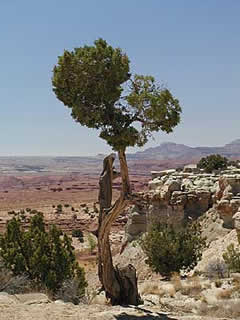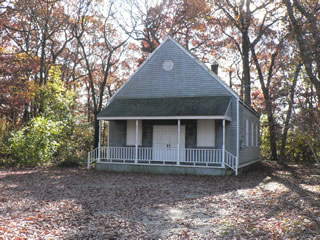Lent Beyond Easter
A guest essay by Margalynne Armstrong. Margalynne is associate professor of law at Santa Clara University School of Law, and junior warden at Saint Mark's Episcopal Church in Palo Alto, California.
For Sunday March 7, 2010
Third Sunday in Lent
Lectionary Readings (Revised Common Lectionary, Year C)
Isaiah 55:1–9
Psalm 63:1–8
1 Corinthians 10:1–13
Luke 13:1–9
As a child my understanding of Lent was formed in the Catholic Church. I thought that Lent was about giving something up, so we could be like Jesus who suffered and sacrificed in the wilderness for forty days and nights. It’s possible that I misunderstood what I was taught, but that explanation of Lent made sense within the religious worldview of my childhood, where the whole purpose of church was to help us win God’s approval and become eligible for heaven after death.
As I grew older and bounced between religions, Lent receded in significance. I went to college at a Religious Society of Friends (Quaker) affiliated school and sometimes attended weekly Meeting. Quaker religious practice was pretty much on the opposite end of the Christian spectrum from Catholicism, and the manner in which the two faiths observed Lent was quite illustrative of the extreme contrasts. Friends traditionally believe that the birth, crucifixion, and resurrection of Christ should be remembered each day of the year, not just on particular days. Many Friends believe that it is hypocritical to fast during Lent and then eat excessively during the rest of the year, so they choose to live simply all year.1
 |
Fig tree. |
The Quaker perspective makes intellectual sense to my adult self, but how many Christians can actually live each day in remembrance of Christ’s birth, crucifixion and resurrection? Were God to confront a Christian lay person at any random moment, would it not seem highly likely that the person had not thought of (much less lived in remembrance of) Christ’s life within the preceding twenty-four hours? How well would most of us do if challenged with a pop quiz about how we lived out our faith that day?
Then he told this parable: “A man had a fig tree planted in his vineyard; and he came looking for fruit on it and found none. So he said to the gardener, ‘See here! For three years I have come looking for fruit on this fig tree, and still I find none. Cut it down! Why should it be wasting the soil?’ He replied, ‘Sir, let it alone for one more year, until I dig around it and put manure on it. If it bears fruit next year, well and good; but if not, you can cut it down.”
If God is the landowner of the parable, and Christians living each day in remembrance of Christ is the fruit God seeks, fruitless encounters must surely predominate in modern secular society. Most spiritual practices get relegated to Sabbath days and holy seasons, but the parable does not indicate that the landowner only visits on weekends and holidays.
Yet even though the landowner encounters one fig-free tree after another, Christ, the parable’s gardener, intercedes on humanity’s behalf. If Christ believes that his caretaking can successfully bring forth fruit within the next year, he must see something alive within the bare plants.
 |
Gardening girl. |
This potential for human blossoming under the ministrations of Jesus is where Christian traditions of seasonal Lenten sacrifice and discipline intersect with the Society of Friends’ conception of Lent as undifferentiated from other seasons. Lent, at least in the Northern Hemisphere, straddles the end of winter and the beginning of spring, when the earth resumes “breeding Lilacs out of the dead land, mixing Memory and desire, stirring Dull roots with spring rain.”2
The Lenten season reflects the natural world as a personal time for intentional weeding, watering and providing the garden nutrients for growth beyond Easter, continuing throughout the entire year in the Quaker tradition. Certainly Christ’s forty days and forty nights in the wilderness were preparation for the ministry and sacrifices of his future and not just penitence for previous transgressions.
So I have come to view Lent as a time to start developing a positive new habit or behavior that helps sustain my health, faith and ministry to others. A Lent dedicated to being mindful about taking care of our bodies and spirits is as holy as a Lent spent forgoing pizza or ice cream, particularly when some modicum of that mindfulness is incorporated into one’s post-Easter life.
My developing understanding of Lent revives another childhood memory, that of a favorite book, The Secret Garden, by Frances Hodgson Burnett. I now see the story as another Lenten parable. Although I must have read the book a half dozen times, I never really noticed the sometimes heavy-handed Christianity in the story of two sickly and spoiled children, Mary and Colin, who find a hidden garden neglected and overgrown. The garden is discovered in the Lenten springtime:
When Mary found this garden it looked quite dead," the orator proceeded. "Then something began pushing things up out of the soil and making things out of nothing. One day things weren't there and another they were.”
 |
Quaker meeting house. |
By the novel’s end, the children’s work reviving the garden has helped nurse them back to health and humanity. Although Mary and Colin are un-churched, the garden stirs in them a nascent religious awe. When their friend Dickon sings the Doxology, Colin says, "It is a very nice song," he said. "I like it. Perhaps it means just what I mean when I want to shout out that I am thankful to the Magic.”
Praise God from whom all blessings flow, Praise Him all creatures here below, Praise Him above ye Heavenly Host, Praise Father, Son, and Holy Ghost. Amen."
Not being familiar with the Anglican Doxology written by Thomas Ken, my younger self did not read those words in The Secret Garden and hear a hymn as I do now. But from the first, I recognized that Mary and Colin’s hearts and lives changed when they turned outward from themselves. Likewise, a Lent that does not focus on what we personally consume, but instead turns outwards from ourselves, can transform our lives beyond Easter Sunday.
[1] See, http://www.the-spiritual-path.com/quakers.html; http://www.buzzle.com/articles/quakers-the-religious-society-of-friends.html
[2] T.S Eliot, The Waste Land.
For further reflection
* Henry Vaughan (1621-1695)
The Revival
Unfold! Unfold! Take in His light,
Who makes thy cares more short than night.
The joys which with His day-star rise
He deals to all but drowsy eyes;
And, what the men of this world miss
Some drops and dews of future bliss.
Hark! How His winds have chang’d their note!
And with warm whispers call thee out;
The frosts are past, the storms are gone,
And backward life at last comes on.
The lofty groves in express joys
Reply unto the turtle’s voice;
And here in dust and dirt, O here
The lilies of His love appear!
Image credits: (1) MyFirstChurch.com; (2) imgs.sfgate.com; and (3) The Farmingdale-Bethpage Historical Society.





